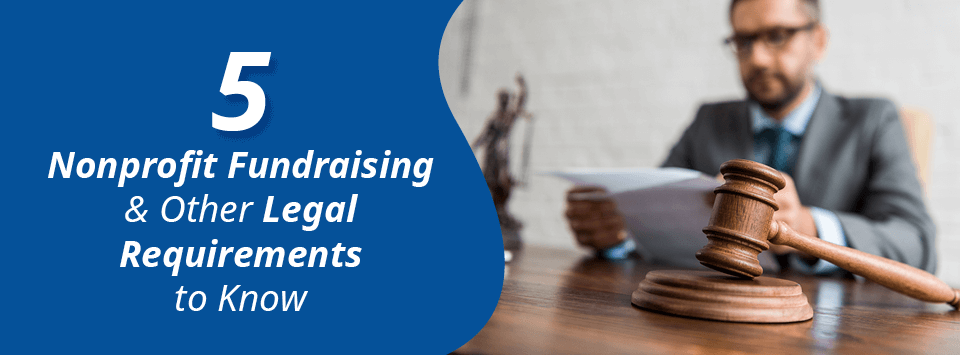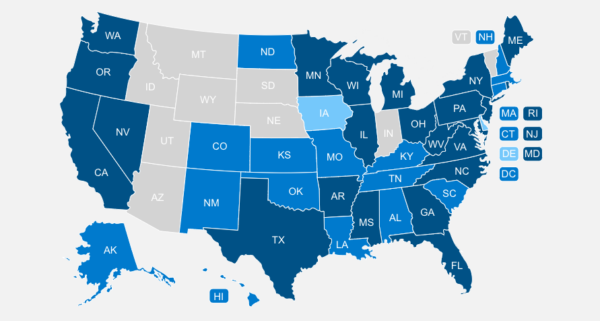American Rescue Plan Act Relief For Nonprofits
March 16, 2021
5 Nonprofit Fundraising & Other Legal Requirements to Know
April 5, 2021Charitable Solicitation Registration: A Compliance Guide

Charitable Solicitation Registration: A Compliance Guide

Did you know that over 40 states require nonprofits to register prior to fundraising? Fundraising regulations vary drastically from state to state, but no matter what vehicle your organization uses to fundraise (your website, texting, phone calls, or direct mail), if the underlying activity is solicitation, that’s often a regulated activity by state officials.
501(c)(3) organizations have specific rules for obtaining the necessary licenses and permits before they can legally solicit donations within a state. This requirement is known as “charitable solicitation registration.”
Charitable solicitation is regulated at the state level, and rules vary by jurisdiction. Complying with such rules enables your organization to continue fundraising and pursuing its mission. After all, your nonprofit can only achieve its goals if stakeholders trust that your organization will operate ethically.
For more than 30 years, the experts here at Labyrinth have worked with thousands of organizations to help them register their organizations. We handle every aspect of the charitable solicitation registration process, so our nonprofit clients can remain compliant and reinvest their time into their mission. Based on ample firsthand experience, we’ve put together a guide that walks through the ins and outs of charitable state registrations. Here’s what we’ll cover:
- Common Questions about Charity Registration
- Penalties for Failing to Register for Charitable Solicitations
- Typical Charity Registration Requirements
- How Labyrinth Can Help Your Nonprofit with Charitable State Registration
Registering a charitable organization can be a lengthy process, especially if you’re new to the nonprofit landscape. Let’s dive into answering some common questions nonprofit leaders have about registration.
Common Questions about Charitable Solicitation Registration
To successfully complete your charitable registration, it’s important that you obtain the answers to any lingering questions regarding the process. This will allow your team to move forward with the confidence that you’re fulfilling the correct requirements.
What is a charitable solicitation registration?
Known colloquially as fundraising registration, this is the process by which a nonprofit becomes licensed to solicit funds in a state with charitable registration requirements. The process requires submitting paperwork to the appropriate state charities bureau, which is usually managed by the State Attorney General or Secretary of State.
If your nonprofit engages in fundraising activities, it’s likely that you will need to file a registration form with any state where you solicit donations.
Which states require charitable solicitation registration?
Currently, 41 states plus the District of Columbia require charities to register before soliciting contributions—whether by email, direct mail, phone call, or face-to-face. This is accomplished by filing copies of the charity’s organizing documents, IRS Form 990, and audit results with the appropriate state authorities, which we’ll explore in-depth below.
Further, there are several states that require nonprofits to publish disclosure statements, which alert donors that the nonprofit is registered with the state. This helps build trust with supporters that your organization is operating in full compliance with the state regulations. Regarding these disclosure statements, some of these states have strict requirements, such as font size and how the statement is written.
The states that don’t require solicitation registration or disclosure statements include Delaware, Idaho, Indiana, Iowa, Montana, Nebraska, South Dakota, Vermont, and Wyoming. However, there are exemptions for other states. For instance, organizations in Arizona don’t need to register unless it’s classified as a veteran organization.
For complete details on which states require and don’t require charitable solicitation registration, explore our state-by-state fundraising registration requirements page.
What is a charitable state registration number?
A charity state registration number is a unique identifier which most states assign once a charity is registered with their state. However, some states, such as Virginia, instead use the charity’s federal Employee Identification Number (EIN).
Penalties for Failing to Register for Charitable Solicitations
State penalties for unlicensed solicitation are diverse and oftentimes severe. State agencies that oversee fundraising activities take unlicensed solicitation very seriously. For example, some states—including California, Pennsylvania, and Virginia—publish public lists of organizations that are considered delinquent.
Soliciting donations before registering, failing to register after receiving funds, or filing late renewal applications can trigger any number of consequences, such as:
- Fines, late fees, and penalties from the state
- Civil and criminal action against officers and directors
- Revocation of tax-exempt status
- Denial of the right to solicit funds
- Lost donations or grants
Nonprofits could incur these consequences even if they unintentionally break the rules. The risks associated with not complying with charitable solicitation registration laws go beyond these state penalties, though. The damage to your nonprofit’s reputation could be irreparable.
As a direct result of negative publicity, you can hurt relationships with donors and grantmakers. Prospective funders are unlikely to donate or provide grants to a charitable cause if they do not trust a charity to ethically and efficiently represent that cause.
While the list of penalties is extensive, the best way to avoid them is to stay up-to-date on all charitable solicitation registration requirements.
Typical Charity Registration Requirements
Successful charitable solicitation registration requires many steps. Forms and requirements vary widely between states, so we suggest visiting the state government agency’s website for the most up-to-date information.
For instance, organizations looking to register in Mississippi would navigate to the Mississippi Secretary of State’s website, while organizations looking to register in Ohio would check the Ohio Attorney General’s website.
Additionally, keep in mind that many states not only require initial registration, but they also require renewal registrations in subsequent years. The timing varies on a state-by-state basis, so be sure to double-check renewal deadlines for each area where you want to solicit donations. Also remember that filing fees vary by jurisdiction and are usually calculated based on total gross revenue during the previous year.
In the meantime, we’ll walk through the common documentation and filings that nonprofits need to submit when registering to fundraise. Now, let’s dive into the specific documents your team needs to file.
IRS Form 990
As we touched on earlier, most nonprofits are required to file the IRS Form 990 on an annual basis. The IRS and stakeholders use this form to evaluate a nonprofit’s operations, and it’s required for the organization to maintain its tax-exempt status. This document includes information on your organization’s:
- Purpose
- Governance policies
- Programs
- Detailed financial information
Even within the 501(c)(3) category of organizations, there’s variation in the filing process. Depending on the gross receipts and assets held by your organization, you might find that you’re eligible to file a 990-EZ or 990-N form, two shorter variations of the standard Form 990. There are also other variants such as the 990-PF, designed specifically for private foundations.
For complete details, check out our list of frequently asked questions about File 990s, which explores questions regarding state filing requirements, deadlines, and extensions.
Nonprofit Bylaws
Also commonly required by most states for initial registration, nonprofits have to file a copy of their bylaws. In short, these are legal governance documents that outline the rules an organization must adhere to in all operations. It addresses non-negotiable items such as:
- Officer position descriptions and responsibilities
- Board responsibilities and activities, like structure and term length
- Voting procedures
- Official meeting requirements
- A conflict-of-interest policy
Bylaws help leadership resolve conflict and run your organization efficiently. Filing this information demonstrates to the public and the states you’re registering in that your organization is a responsible steward of charitable funding and will use that funding to advance its mission.
Nonprofit Articles of Incorporation
Nonprofits are usually required to file a copy of their articles of incorporation, which function as their constitution. Along with your bylaws and governance policies, this is one of your organization’s guiding documents.
The name of these founding documents varies across organizations. For instance, trusts and unincorporated associations may need to file their articles of organization. Other common terms that reference this type of document include “certificate of incorporation” and “charter document.” No matter what your organization calls this file, the overall purpose behind them remains the same.
Within your articles, you should officially declare the following information about your organization:
- Name
- Location
- Purpose
- Initial directors
The general provisions that must be included in your articles of incorporation are similar in each state. However, some states require that you mail in a hard copy, use their official forms, or use special forms based on your organization’s purpose. Be sure to look up any specific requirements that may apply to your organization before getting started with this important documentation.
IRS Letter of Determination
This is simply a letter from the IRS confirming that a nonprofit organization’s tax-exempt status has been approved and that it’s been granted 501(c)(3) status. Beyond exemption from federal income tax, this letter affords your nonprofit with several advantages, including the following:
- Your donors can claim their contributions to your nonprofit on their annual tax returns.
- You can apply for grant funding that’s available only to tax-exempt organizations.
- You may even receive discounts on USPS postage rates, among other goods and services.
A letter of determination includes the organization’s legal name and trade name (if applicable), EIN number, and the effective date of 501(c) status. States often require nonprofits to submit a copy of their determination letter, which you can request from the IRS.
List of Officers, Directors, and Trustees
Carefully-selected board of directors or trustees are vital to the success of any nonprofit. While your nonprofit’s bylaws define these individuals’ roles and responsibilities, many states require an additional list of those who sit in these positions when you submit your annual registration paperwork. You’ll likely need to list their names, addresses, and official titles at your organization.
State-Specific Forms
Individual states have specific forms for initial charity registration, reporting requirements for new nonprofits, annual filing requirements for existing organizations, employment filings for organizations with employees, and state-specific statutes governing charitable solicitation.
Audited or Reviewed Financial Statements
Based on the state in which you’re attempting to register, your organization might be required to provide audited financial reports or reviewed financial statements. The financial documentation you need to file depends on a few factors, such as:
- Total revenue received during the fiscal year
- Total contributions received during the fiscal year
- Whether you receive grants from the state or federal government
Keep in mind that the threshold for these requirements also varies. In some states, the threshold of contributions or income that triggers the financial audit requirement is relatively low, while others have higher thresholds.
Contracts with Fundraising Counsel, Solicitors, and Consultants
Independent contractors like fundraising counsel and professional solicitors are hired to help your nonprofit succeed with your fundraising strategy. They don’t include your nonprofit’s officers, employers or legal/financial advisors. These individuals actively participate in solicitation, so hiring this outside help typically imposes charitable solicitation registration requirements.
Most states require nonprofit organizations to submit copies of fundraising contracts they have with professional fundraisers before starting any fundraising campaign. While fundraising professionals are responsible for their own registrations, nonprofits that have contracts with these contractors are advised to do their due diligence by verifying their compliance status.
Commercial Co-Venture Contracts
If your nonprofit makes an arrangement with a business to receive a percentage of sales, keep in mind that it’s often a regulated activity. This activity is often referred to as “commercial co-venture” or “charitable sales promotion.”
While crafting a corporate philanthropy arrangement like this is quite common in the nonprofit sector, many states want to ensure it’s handled ethically, since consumers may be motivated to purchase goods or services if they believe a portion of their money will go to a charitable cause. Similar to contracts with professional fundraisers, at least 22 states require commercial co-venture agreements to be submitted to the appropriate state office.
These contracts should have clear messaging regarding the specifics of the agreement, such as active date range, the exact percentage of sales to be donated, and a plan to disclose the total money raised at the end of the campaign.
How Labyrinth Can Help Your Nonprofit with Charitable State Registration
The amount of time nonprofit leaders need to devote to registering their charity is challenging for many organizations. Nonprofit leaders’ time is precious, and time spent on these filings takes them away from working on advancing the organization’s charitable purpose. However, the consequences of failing to do so properly can be detrimental. The regulations surrounding registration are extensive and can be overwhelming to navigate without a professional by your side. That’s where Labyrinth comes in.
Our expert team handles every stage of the charitable solicitation registration process, so your nonprofit can remain compliant and refocus your energy on fulfilling your mission.
With more than 30 years of experience under our belts, we’ve had plenty of time to refine our approach to registration and nonprofit compliance. We work with our clients to determine specific registration requirements, keep track of filing deadlines, and act as their liaison with the state.
Here’s a specific rundown of our charitable registration services:
- Registration form preparation. We prepare all the forms necessary to keep you registered in the states where you want to solicit donations.
- Applicable extension requests. We’ll keep track of form deadlines and file necessary extension requests on your behalf.
- Legal counsel and accountants. We have both legal counsel and accountants on staff to make sure each filing is accurate.
We help you through the entire process and can even set up your registered agents, pay the state fees, sign and notarize your forms, and file directly with the states.
Based on the number of registrations we complete per year, our firm is by far the number one charity registration firm in the nation. We file tens of thousands of state registrations annually, and with states’ constantly-changing laws and forms, we can help you remain compliant. That way, you can avoid fines, civil suits, revocation of your tax-exempt status, and any other negative consequences.
Staying up-to-date with charitable solicitation registration requirements can be challenging, but we can manage those obstacles for you. Reach out to the Labyrinth team to discuss your charitable solicitation registration needs.
[maxbutton id=”1″ url=”/contact-us/” text=”Contact our team for your charity registration needs.” ]
Conclusion & Additional Resources
There’s an excellent chance that your organization is fundraising within one of the 41 states that require charitable solicitation registration, so to comply with state laws, your organization must go through the proper steps to register. Between filing the right forms, meeting deadlines, and paying registration fees, there’s a lot that goes into successfully registering your charity, sometimes making it tricky to navigate.
Instead of taking on this task alone, enlist help from an experienced professional. Labyrinth will manage every step of the charitable solicitation registration process, so your team can rest assured knowing that you’re compliant in the states where you want to fundraise.
While this complete guide covers what you need to know about registering your organization, there’s still much to learn regarding charitable solicitation and making the most of your nonprofit’s efforts. To continue learning about registration and charitable compliance, explore these resources:
- State Fundraising Registration Requirements. Check out this page to explore state-specific requirements, so you can determine the right steps to take to register your charity and start fundraising.
- Maintaining Fundraising Momentum. Going remote has led to a tricky fundraising landscape. Learn to navigate the current challenges and make the most of your nonprofit’s fundraising.
- Charitable State Registrations Information. Explore this helpful list of resources, which contains everything you need to know about registering and staying compliant.



















